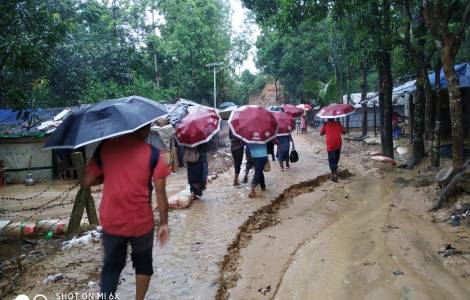
Caritas Bangladesh
Cox's Bazar (Agenzia Fides) - “Rohingya people living in Bangladeshi refugee camps are victims of the violent and traumatic uprooting from their homeland in Myanmar; victims of the health emergencies such as dysentery and pox; victims of the repeated climate emergency they face when cyclones batter Bangladesh. And now they are also victims of the global pandemic, which is bearing down on Bangladesh", denounced Inmanuel Chayan Biswas, communications officer for Caritas Bangladesh's Rohingya Response Program based in Cox's Bazar.
As highlighted in the note sent to Agenzia Fides, members of the Rohingya community in the refugee camps of Bangladesh, not only face the challenge of living in overcrowded housing with ten or more people in a room, but are also forced to use toilets and common water systems. They cannot maintain adequate social distances, nor respect hygiene measures that represent effective prevention against the spread of the virus. The tragic pandemic in progress is only one of the numerous emergencies that mark their lives.
"One of the key measures to prevent the spread of the coronavirus pandemic is social distancing. But if you live in a refugee camp, you don't have the luxury of space to do this", Biswas continues.
The first coronavirus case in the Rohingya community was registered May 14, 2020. As of late June, there were 45 confirmed cases and four deaths. "However, due to lack of expertise in the testing centers, the accuracy of those numbers – stresses Biswas - is unclear. The spread of Covid-19 has also forced the Bangladeshi government to limit the refugees' access to primary health care facilities".
Initially, Rohingya who were critically ill with Covid-19 were referred to Ukhiya General Hospital or Cox's Bazar Medical College. Now it is not possible because these hospitals are facing challenges to provide treatment facilities to the local people.
According to Biswas, overcrowded shelters in the Bangladeshi refugee camp mean proper distancing and overall hygienic measures cannot be maintained "to provide the effective prevention against the spread of the coronavirus". Caritas Bangladesh provided soap and hygiene kits and have installed hand-washing stations in public places and near toilets at the refugee camp. "People know that they need to wash their hands frequently, but a big challenge is the poor water supply and sanitation facilities at the camp", adds Biswas.
Meanwhile, with the onset of monsoon rains, there is a big danger of landslides and floods overwhelming the shelters. Deterioration of camp roads and pathways greatly limit access to services and amplify protection issues with concerns such as physical and sexual abuse. (AP) (Agenzia Fides, 27/6/2020)